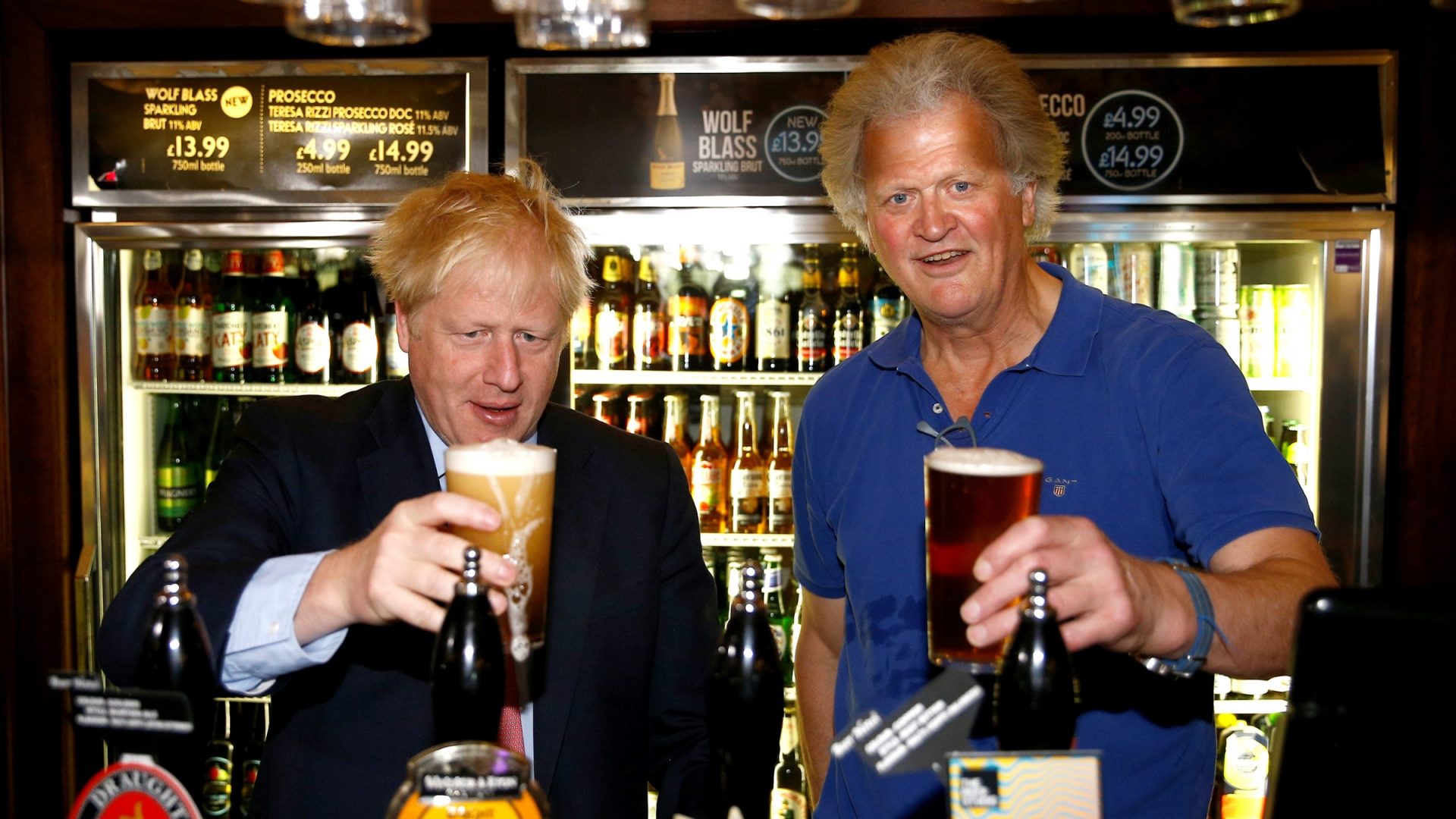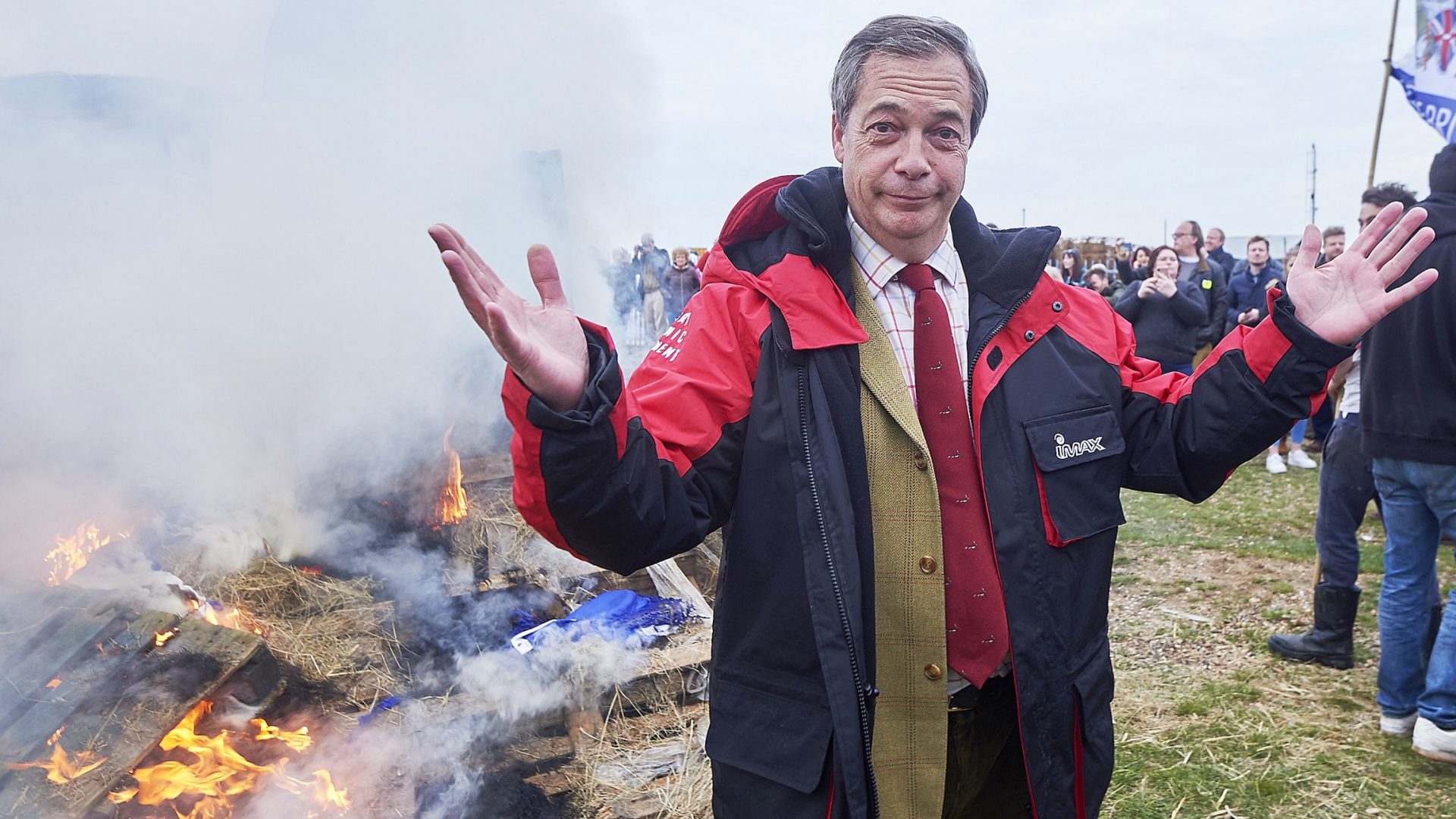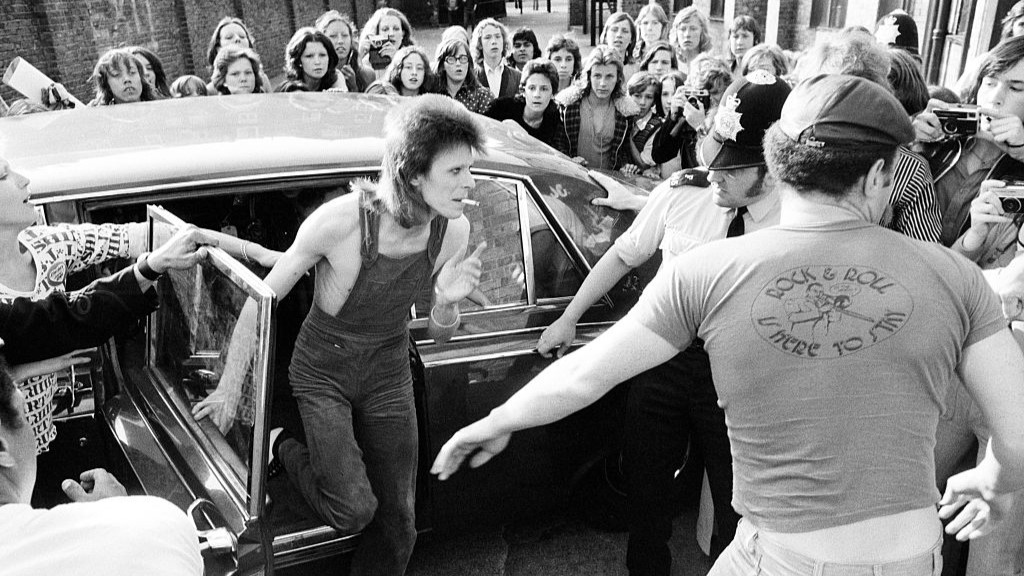I was not sure what to expect but it certainly wasn’t this. Tim Martin appears on my computer screen for our Zoom interview, on his exercise bike, with a multicoloured towel around his neck. “When you get to my age you have to do this or you are in trouble,” he explains, and for the next half hour or so he continues to pedal away regardless.
It also turns out to my surprise that we have something in common. We both went to rugby-mad schools near Belfast and we have both completely lost our Ulster accents, although, unlike me, Tim can still do a very credible impression of one. He is also refreshingly straight talking; he has agreed to do this interview even though he knows full well that not many readers of The New European are ever going to agree with him.
That may be because he originally trained as a barrister, who are always willing to argue for the defence or the prosecution, but then never practised at the bar. Instead, he bought his first pub in 1979, naming it Wetherspoon after a schoolteacher who said he would never amount to much. His company now owns more than 800 pubs and Martin is a millionaire many times over. He was one of the big-name supporters of Brexit and donated £200,000 to Vote Leave.
That does not exactly make us blood brothers although funnily enough it turns out that we do agree on one thing: it is all David Cameron’s fault.
Martin decided to support Brexit not because he was a dyed-in-the-wool UKipper but only after seeing Cameron fail to get a significantly better deal from Brussels, he says. “For me, I had opposed the euro 20 years before Brexit, but not the EU, not a common market and so I was a neutral. I hadn’t voted in European elections. I thought the free movement of labour was a good thing.” But the elephant in the room for Martin was and remains democracy.
“I knew people who were worried about the lack of democracy… and so I only decided to go for Brexit when David Cameron came back from the EU, because it was he who said it needs – and I quote, ‘fundamental reform’, which is what I thought it needed – to be more democratic. And instead of saying, ‘I didn’t get very much, I’m disappointed, but I still think we should stay in and reform from within’. He fibbed, really, and he said, ‘I’ve got reform’. And so at that point, I think I and probably millions of others decided ‘it’s better to leave’.”
I’d go even further and say that Cameron didn’t need to call a referendum, and then ran an appallingly bad campaign in which his “friends” ran rings around him. But that’s just my personal opinion and it is also where our agreement ends.
It is interesting that at first Martin, one of the Brexit poster boys, is not full of shallow anti-Brussels rhetoric. He is quite passionate about the need for and the success of democracy, especially the benefits it brings to the economy. He compares the success of West Germany to East Germany and then brings up Japan: “Defeated in a war, in a terrible state. Becomes democratic almost at the point of a gun… and it becomes, in three decades, the second biggest economy in the world. It’s a remarkable thing.”
Which is fair enough, I suppose, as far as it goes. But the whole point of the EU is really to share some decision-making at an international level in order to enable more economic growth and cooperation. That explains why since Brexit the UK’s trade is down, growth has suffered and there are labour and skills shortages across the economy.
But like many other Brexiteers, Martin soon moves on from his love of democracy to endorsing some of the Leavers’ more outlandish claims. Like so many, he just can’t see any economic damage from Brexit. “I just don’t see it. I mean, your readers aren’t going to agree with me, I know. I just don’t think it’s true, I don’t think it’s true at all. [We have] the lowest-ever unemployment, in my lifetime, the stock market’s just about at a high, half the unemployment of France.”
Wetherspoon, he says, is also not having any problems recruiting staff, although he does favour easier immigration from the continent, a view that he says is “not inconsistent with a pro-Brexit stance”. He insists that recent Wetherspoon pub closures have nothing to do with Brexit, with sales at their “highest-ever levels”.
That doesn’t mean that Martin thinks everything about Brexit has been a success. Like so many others, he believes the problem is that Brexit has just not been done properly and he certainly feels let down by both Boris Johnson and Liz Truss.
For a start, it seems, Johnson didn’t know what he wanted. “He didn’t have any plan at all… and reacted to events … it was all vacuous PR,” says Martin, who pulled pints with Johnson in a photo opportunity during the latter’s 2019 leadership campaign. “As Jonathan Sumption said, Boris never gets into the detail and so that’s what prevents you from having a plan. He’s reacting to events all the time.’
Although for an obviously hard-headed businessman, Martin seems rather naive about the qualities which make for a good PM. “I backed him. I thought he’d be good because he’s run a magazine successfully for eight years. And he’d been mayor of London and been quite successful, really. [I thought] there’ll be a lot of jobs created, and so on,” he says.
Lots of us could always see that Boris Johnson couldn’t be trusted to run a whelk store, and eventually, Martin also decided he wasn’t up to the job. “It’s a difficult job being prime minister. I’m not sure I could do it and he couldn’t do it very well.”
However, he seems to maintain a touching faith in the talents of politicians who are in any way connected with business. His high hopes that Johnson could run the country because he was editor of the Spectator were dashed. But then he also thought Truss would be good because she used to be an accountant.
“Well, I feel slightly sorry for her, because leaving aside all the policies, she sort of didn’t get a chance, you know? And she probably misjudged things. James Carville, who was a helper for President Clinton, said he really wanted to be reincarnated as the bond market, because everyone is frightened of the bond market, and I think she missed that point.”
But when you ask Martin what he would have preferred to see happen instead, it turns out he is quite the Brexit ultra. A true believer, who thinks that all we have to do is tear down all the barriers to trade, abolish all the tariffs and, hey presto, we will be in Brexit heaven.
“The disadvantage of the EU as I perceived it – this is not an anti-EU point per se – is that although there’s free trade between the countries of the EU, which is a plus, there are massive protection barriers from stuff coming from outside the EU. I looked it up; more than 12,000 tariffs on bananas, rice, children’s clothes. If you got rid of some or most of the protection of the tariffs, you do decrease prices in the shops for consumers.
“That was an argument I made for a time, but we’ve left and we could have reduced the tariffs, but apart from some Aussie wine, I don’t think we have. So, there’s a lot of things we could do to become a free trading nation, which was one of the potential advantages of Brexit.”
But, when you point out that even Prof Sir Patrick Minford, the favourite economist of Brexiteers, admitted that such a policy on tariffs would destroy British manufacturing industry, he is unimpressed. “Yeah, I think that’s a slight paraphrase. I think that there are countries which have reduced them to very low level and more or less eliminated them. I think the Kiwis and the Aussies have done quite a good job, Singapore, a few others.
“My instinct is that trying to have separate trading agreements of 1,000 pages each… is just too complex. You don’t need trade agreements, left, right and centre. So, get rid of the tariffs on bananas, even if it makes it more difficult to have a free trade agreement with South America. Get rid of tariffs on car parts, even though it makes it more difficult to get a trade agreement with Japan. I think you’d get a lot of goodwill from doing that.”
Unilateral free trade is certainly one way of going about Brexit, but not one that any government has seriously considered. Unilaterally opening up your whole economy to foreign competition and hoping that some “goodwill” will balance out the appalling damage that would cause has not been taken seriously by anyone, even the Conservative Party.
But for Martin, the themes are clear. His emphasis on democracy is little more than the usual Brexit rant about taking back control. If things are not improving, it is because the government had no plan, and we haven’t gone far enough, fast enough.
Although there is something he has in common with my last interviewee, Guy Hands – a businessman with a very different view of Brexit. Hands called for “a nicer, softer, less aggressive country”. Martin wants more understanding. “The nation is very polarised over Brexit, which makes it difficult, so symbolic things which one side or the other believes in are more important than practical measures. So, it is a very difficult job, maybe it’s to do with social media?”
Maybe? But surely the real difference between leave and remain, is that the Brexit supporters don’t think they are the ones that have made the country nastier and more divided. While the Remainers are absolutely certain that it is the Brexiteers’ fault.
But as for Tim Martin, he seems happy enough with the world he has helped to create, and as I end the call and the interview he is still happily peddling away on his stationary bike.




